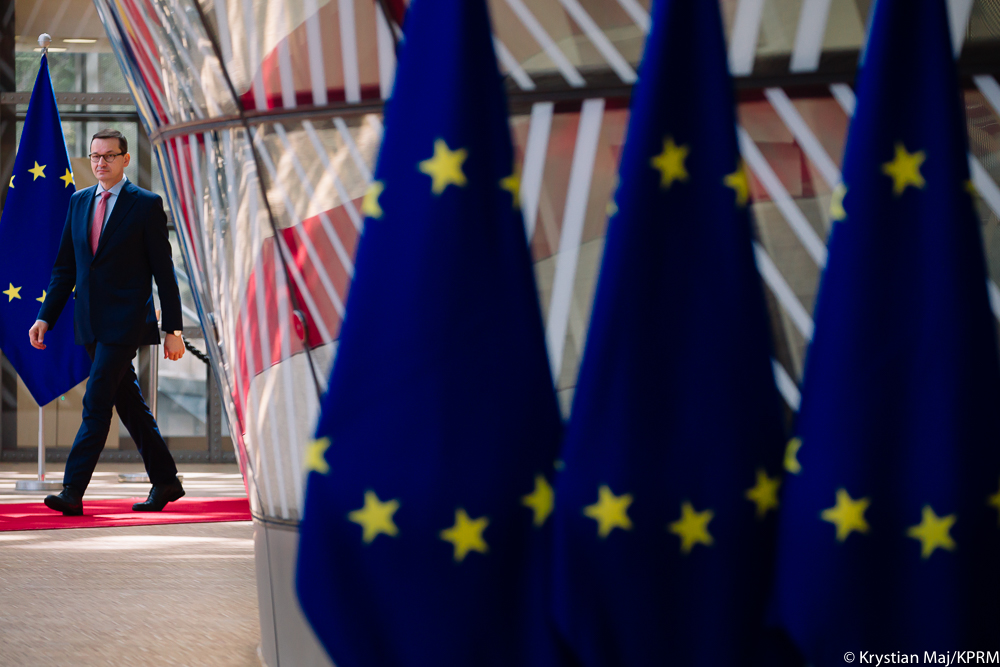By Paweł Wiejski
In a letter sent to EU leaders on Monday, Polish prime minister Mateusz Morawiecki voiced his opposition to proposed rules linking the disbursement of European funds with the rule of law.
According to Morawiecki, the mechanism goes against the EU treaties and undermines the political agreement on the EU budget reached at the European Council summit in July.
According to the draft of the prime minister’s letter seen by Notes from Poland, if the regulation is not amended to “guarantee the rights of Member States enshrined in the Treaties”, the overall budget – of which Poland is the largest recipient – will not be ratified by the Polish parliament.
Morawiecki stopped short of calling to scrap the mechanism altogether, admitting that for the most part it aims to prevent fraudulent use of EU funds. However, he claims in his letter that some parts of the proposed regulation could be used for political reasons to punish certain countries arbitrarily.
According to Morawiecki, this could lead to discrimination against some member states by European institutions. He also says that the mechanism gives the commission the right to unilaterally impose financial sanctions, although his claim is not consistent with the draft regulation in its current form.
Polish PM's letter threatening veto of EU budget argues that rule of law conditionality would be "discriminatory". In fact, it would apply to all member states. He also says "Commission would have unilateral right to impose financial sanctions" – which is entirely untrue. https://t.co/ODOfAOq5xG
— Stanley Bill (@StanleySBill) November 13, 2020
How does the mechanism work?
The rule of law conditionality mechanism was provisionally agreed at the beginning of November by representatives of the Council of the EU (representing member states) and the European Parliament, more than two years after it was first put forward by the European Commission. Before it enters into force it must be officially adopted by both institutions.
In the proposed form, the mechanism would be triggered by the European Commission if it finds that disbursement of EU funds in a given country is threatened by the deficiencies in the functioning of that country’s administration. While “rule of law” was dropped from the title of the regulation, the draft still references “endangering independence of judiciary” as one of the possible reasons to initiate proceedings.
For the sanctions to be implemented, a qualified majority vote of member states in the Council of the EU is necessary. This makes it different from the existing mechanism protecting rule of law in member states, the so-called Article 7 procedure, which can be vetoed by a single country. It has so far proved ineffective, with Poland promising to block measures directed against Hungary and vice versa.
“Soft” veto threat
The Polish ultimatum came a few days after a similar position was expressed by the Hungarian authorities. In a letter sent immediately after the rule of law conditionality mechanism had been agreed, Hungarian prime minister Viktor Orbán suggested that his country would veto the entire long-term budget of the EU if the controversial mechanism is not removed.
The wording of the Polish letter is much less categorical, as it refers only to the ratification by the Polish parliament. The only part of the budget package that requires agreement by national parliaments is the recovery fund – €750 billion financed by issuance of a common EU debt to help fight the economic crisis triggered by the COVID-19 pandemic.
This makes the Polish veto threat less credible, says Piotr Buras, head of the Warsaw office of the European Council on Foreign Relations, a think tank.
“If the goal is to block the implementation of the rule of law mechanism, then it’s not going to work,” he told Notes from Poland. “Poland is not threatening to block the main part of the budget, and we will lose the vote on the conditionality mechanism, so on 1 January the agreement and the conditionality mechanism becomes law.”
According to Buras, the ratification of the legal basis for the recovery fund will come in spring next year – too late to influence the decision on the mechanism.
There is a reason why Hungary is opposing the rule of law mechanism much more strongly, notes Agnieszka Smoleńska, head of the European affairs department at the Polityka Insight analysis centre,
“Hungary is opposed to the entire mechanism, because it has problems with fraudulent use of EU funds,” she notes. “The Polish opposition, meanwhile, is based on ideological grounds – there are few cases of irregularities in spending of EU money, which are not systemic in nature.”
Veto reveals rifts in coalition
In Buras’s view, Morawiecki does not actually want to block the EU budget, but his hand was forced by politics inside the ruling camp.
“For Zbigniew Ziobro [the justice minister and head of one of the junior parties in the ruling coalition], this is an excellent reason to attack Morawiecki,” he says. Members of Ziobro’s party, United Poland (Solidarna Polska), have been most vocally opposed to the conditionality mechanism, for weeks calling on Morawiecki to take a stand and openly threaten to veto the EU budget.
One of Ziobro’s colleagues, deputy minister for state assets Janusz Kowalski, claimed this week that the proposed rule-of-law mechanism is part of a plan for “Germany to colonise Poland” by “violating the EU treaty to take our sovereignty”.
“We should remember how the German diktat ended for Poland” previously, he warned.
Jarosław Kaczyński, the chairman of the Law and Justice (PiS) party and most powerful figure in the ruling coalition, is also pushing for a veto. In an interview for government-aligned newspaper Gazeta Polska on 14 October he declared that “if threats and blackmail continue, we will firmly defend Poland’s vital interests. Veto. Non possumus”.
Pushed by Ziobro and Kaczyński, Morawiecki and his allies had no choice but to follow through and “show strength and willingness to defend Polish sovereignty”, says Buras.
According to a Kantar survey from the beginning of October, 72% of Poles support linking EU funds disbursement with rule of law. But for Buras, public opinion does not matter for the government: “PiS only cares about the opinion of the most loyal core of the electorate,” he says.
Threats are unlikely to work
The rule of law mechanism had been already been watered down since the original proposal, in line with Poland’s demands, for example by involving the European Council in the sanctions process.
According to Smoleńska, this may dissuade EU institutions and member states from giving in to the ultimatum posed by Morawiecki. “If there was no reaction to concessions so far, what guarantee do they have that further concessions will make Poland change its stance?” she asks.
The main parties in the European Parliament are adamant in their support for the conditionality mechanism. In an interview with Euronews in early November, Manfred Weber, leader of the European People’s Party group, said that linking EU funds with respect for the rule of law is a “red line” for the EP.
While substantial concessions are unlikely, Buras expects that Poland and Hungary will receive some additional assurances from the European institutions.
“There may be some form of statement of the Commission or from the Council that will allow the government to sell it as a success,” he says.
Main image credit: Krystian Maj/KPRM (under CC BY-NC-ND 2.0)





















